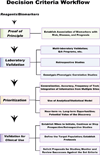New paradigms in translational science research in cancer biomarkers
- PMID: 22424436
- PMCID: PMC3478674
- DOI: 10.1016/j.trsl.2012.01.015
New paradigms in translational science research in cancer biomarkers
Abstract
Despite significant investments in basic science by the US National Institutes of Health, there is a concern that the return on this investment has been limited in terms of clinical utility. In the field of biomarkers, translational research is used to bridge the gap between the results of basic research that identify biomolecules involved in or the consequence of carcinogenesis and their incorporation into medical application. The cultural separation between different scientific disciplines often makes it difficult to establish the multidisciplinary and multi-skilled teams that are necessary for successful translational research. The field of biomarker research requires extensive interactions between academic researchers and industrial developers, and clinicians are needed to help shape the research direction that can be addressed only by a multidisciplinary, multi-institutional approach. In this article, we provide our perspective on the relatively slow pace of cancer biomarker translation, especially those for early detection and screening.
Published by Mosby, Inc.
Conflict of interest statement
The authors have read the journal's policy on disclosure of potential conflicts of interest and have no potential conflicts to declare.
Figures
References
-
- Biomarkers Definitions Working Group Biomarkers and surrogate endpoints: Preferred definitions and conceptual framework. Clin Pharmacol Ther. 2001;69:89–95. - PubMed
-
- Pepe MS, Etzioni R, Feng Z, et al. Phases of biomarker development for early detection of cancer. J Natl Cancer Inst. 2001;93:1054–1061. - PubMed
Publication types
MeSH terms
Substances
Grants and funding
LinkOut - more resources
Full Text Sources
Miscellaneous



